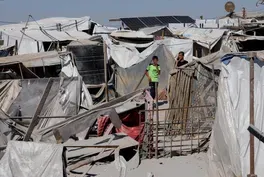
How the closure of EPA offices puts poor communities at risk
Clip: 4/20/2025 | 5m 19sVideo has Closed Captions
How the closure of EPA offices puts poor and minority communities at risk
For three decades, the EPA established offices nationwide to address disproportionately high levels of pollution in poor and minority communities. Now, the Trump administration is eliminating these environmental justice offices as part of its effort to end DEI programs and cut spending. Ali Rogin speaks with Amudalat Ajasa, who covers environmental health for The Washington Post, for more.
Problems with Closed Captions? Closed Captioning Feedback
Problems with Closed Captions? Closed Captioning Feedback
Major corporate funding for the PBS News Hour is provided by BDO, BNSF, Consumer Cellular, American Cruise Lines, and Raymond James. Funding for the PBS NewsHour Weekend is provided by...

How the closure of EPA offices puts poor communities at risk
Clip: 4/20/2025 | 5m 19sVideo has Closed Captions
For three decades, the EPA established offices nationwide to address disproportionately high levels of pollution in poor and minority communities. Now, the Trump administration is eliminating these environmental justice offices as part of its effort to end DEI programs and cut spending. Ali Rogin speaks with Amudalat Ajasa, who covers environmental health for The Washington Post, for more.
Problems with Closed Captions? Closed Captioning Feedback
How to Watch PBS News Hour
PBS News Hour is available to stream on pbs.org and the free PBS App, available on iPhone, Apple TV, Android TV, Android smartphones, Amazon Fire TV, Amazon Fire Tablet, Roku, Samsung Smart TV, and Vizio.
Providing Support for PBS.org
Learn Moreabout PBS online sponsorshipJOHN YANG: For three decades, EPA offices were established nationwide to address the disproportionately high levels of pollution in poor and minority communities.
Now the Trump administration is eliminating these environmental justice offices as part of its effort to end DEI programs and to cut what it sees as wasteful spending.
Ali Rogin recently spoke with Amudalat Ajasa, who covers environmental health for the Washington Post.
ALI ROGIN: Amudalat, thank you so much for joining us.
First of all, let's talk about the history of the environmental justice movement and how did it become a part of what the EPA does?
AMUDALAT AJASA, Environmental Health Reporter, The Washington Post: Yeah.
The history of the environmental justice movement really recognizes the fact that everybody deserves access to clean air, water and the land that they live on.
Right.
And that was really introduced into the government over 30 years ago by Bill Clinton.
He recognized the fact that these inequities needed to be addressed at the government level because it wasn't happening elsewhere.
It developed 30 years ago, but folks really felt like their voices were heard under the Biden administration.
You know, although some of them felt like the administration didn't go far enough in the legislation that they did pass to make sure that they had cleaner air and water, they felt like for the first time, the risks that they faced were really acknowledged.
ALI ROGIN: What are some specific examples of environmental justice policies at work and the types of problems that this office set out to address?
AMUDALAT AJASA: Some of the policies at work really limited the amount of pollution that industry would be able to pump into the air, the soot that would be allowed to linger in the air, other specific chemicals that they really went after, benzene and other things that for folks who live in Cancer Alley.
That's a day to day reality for them.
ALI ROGIN: Tell us about Cancer Alley, what is that?
AMUDALAT AJASA: Yeah, Cancer Alley is an 85 mile stretch in Louisiana that is full of industry that is pumping a lot of air, pollutants.
And these communities on the front line, they get the name is dubbed Cancer Alley because for them cancer is a reality.
Cancer, you know, it's either somebody close to them that has cancer, somebody in their family, or they know people in their community.
So they have these hot pockets of not just cancer, but other health ailments that the normal American wouldn't be dealing with.
But because they're exposed to so many chemicals on a day to day basis, that's their reality.
ALI ROGIN: I want to play for you.
We spoke to a former EPA environmental justice employee.
He now works at the Natural Resources Defense Council.
Here's how he explained how he worked with community members he was serving.
MATTHEW TAJEDA, Former Director, EPA Office of Environmental Justice: We had a tribal community that was sure that the drinking water that they used for their families and for their animals was contaminated with radioactive toxic elements in it.
We worked with them to make sure that were hearing what was going on with this community.
We provided them with technical assistance and eventually a grant that supported that community in actually testing their own drinking water for levels of radioactivity.
And sure enough, their water was radioactive.
ALI ROGIN: So how are these communities reacting to these offices now being closed?
AMUDALAT AJASA: These communities are devastated.
These communities are gutted.
I mean, the environmental justice office really served as a liaison for the community and the government.
They were on the front lines in many instances in these regions, really connecting with people and understanding what their local challenges were, you know, considering.
Like he talked about water contamination, air contamination, wanting to have electric school buses and solar panels.
So they really understood what was happening on the front lines and they were the voice for those communities and the government.
So to have that office be completely gutted for many of them makes them feel like there a lot of that relationship is now being cut.
And it's a true unraveling of not only what the Biden administration worked to do, but the 30 years of environmental justice work that has been happening in this country.
ALI ROGIN: I want to read for you a statement from EPA Administrator Lee Zeldin.
He says that environmental justice sounds like a good idea in theory and receives bipartisan support.
But in reality, environmental justice has been used primarily as an excuse to fund left wing activists instead of actually spending those dollars to directly remediate environmental issues for those communities.
What do you make of that?
AMUDALAT AJASA: These offices weren't just helping specific DEI communities or, you know, leftist woke communities, but they were helping everybody.
You know, I went to Cancer Alley for a story that I worked on and I was amazed but also shocked by the flares that would go off that kind of lit up the sky, almost like it almost looked like fireworks in a weird way.
And the smells that I smell, you know, I got a headache being in those communities for almost an hour of just driving.
And that's experiences were every day.
It leaves a lot of people who live on the front lines of these communities abandoned, you know, and it means that for the future that they might be sicker.
It means that they have a sicker future.
It means that they don't have as much clean air as they were starting to develop.
It means that their water could be contaminated and there's really nobody there to help them.
ALI ROGIN: I'm Amudalat Ajasa with the Washington Post.
Thank you so much for joining us.
AMUDALAT AJASA: Thank you so much for having me.
Gaia bids farewell after a decade of mapping the stars
Video has Closed Captions
Gaia space observatory bids farewell after a decade of mapping the stars (4m 7s)
News Wrap: Israel finds ‘failures’ in killing of Gaza medics
Video has Closed Captions
News Wrap: Israel finds ‘failures’ that led to killing of Palestinian medics in Gaza (3m 16s)
Ukraine, Russia trade blame for breaking Easter ceasefire
Video has Closed Captions
Ukraine and Russia trade blame for breaking Easter ceasefire as talks to end war drag on (5m 38s)
‘Utter desperation’ in Gaza amid Israel’s aid blockade
Video has Closed Captions
‘Utter desperation’ in Gaza after ceasefire collapse and Israel’s aid blockade (4m 58s)
Providing Support for PBS.org
Learn Moreabout PBS online sponsorshipSupport for PBS provided by:
Major corporate funding for the PBS News Hour is provided by BDO, BNSF, Consumer Cellular, American Cruise Lines, and Raymond James. Funding for the PBS NewsHour Weekend is provided by...















